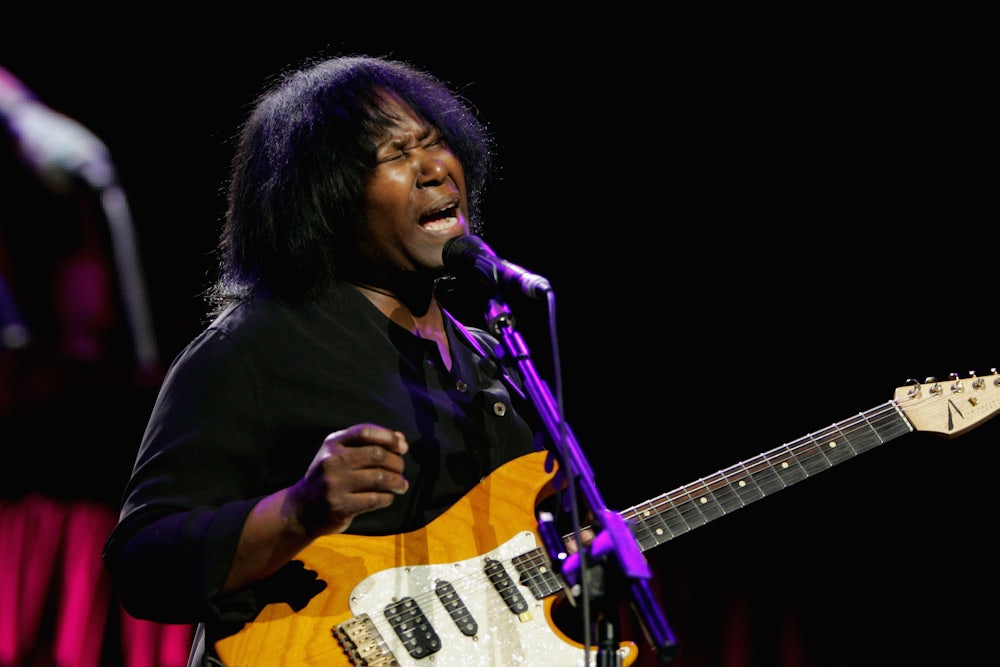At a performance in England earlier this month, the singer-songwriter Joan Armatrading was dressed in black, with her hair shoulder-length and cut into a frame around her face. During the first half of an intimate show, Armatrading played the entirety of Not Too Far Away, her 24th album, released earlier this summer. In the second half, she played older material—the kind of heartsick songs that burrow into your soul and stay there as part of the furniture. Her rendition of “Willow,” in particular, was striking in the way it recalled her performance of the same song nearly 40 years ago. Everything that’s exceptional about the 1977 performance—everything that makes Joan Armatrading, Joan Armatrading—remained miraculously in place. It’s a kind of butch alchemy: basic clothes, strong stance, technical skill, radically soft heart.
For a 67-year-old artist, that continuity over time is intensely inspiring. She has from the start of her career been so distinctive and self-assured (despite her shyness) that she has never had to reinvent herself. It is of a piece with the following Armatrading has built since she released her first album, Whatever’s For Us, in 1972. Her fame is the type that burns intensely at its own temperature, never blowing up to cheap levels that would allow her to fill stadiums by peddling nostalgia.
She was born in Saint Kitts and lived in Antigua before emigrating to Birmingham, England, in 1958 at the age of seven. As a child, she taught herself to play several instruments. She started writing songs on her household piano at 14, and soon afterwards her mother swapped two prams for a guitar at a pawn shop. She left school at 15 and became “a typist and a comptometer operator, which is another kind of typing [and] adding machine,” as she recently told The Telegraph. She started performing at 16.
Her self-titled LP (1976) was her third release, containing three of her most iconic songs: “Love and Affection,” “Down to Zero,” and “Tall in the Saddle,” all about opening up emotionally, softening a hard exterior. “Willow” is from her 1977 fourth album Show Some Emotion. As in many of her very best songs, Armatrading combines strength with an extreme vulnerability. She is offering herself up as a source of stability to another person—“I said I’m strong / Straight / Willing / To be a / Shelter / In a storm”—but in such a way that she herself becomes open to being hurt.
In different hands, “Willow” could have become a feathery, insubstantial thing. But Armatrading is so unlike a wispy North American singer-songwriter—think Sarah McLachlan and her breathy femininity—that the song takes on a backbone. That core identity, of strength in vulnerability, runs through her musical project as a whole. It’s a butchness with no swagger, a power with no arrogance. When she performed it in September, she came off just the same way. It’s the texture and depth to Armatrading’s voice, a thickness that comes with both the deep register and her soulful delivery. The story of “Willow” is a vulnerable one. But there’s a base to its structure.
Armatrading has a very firm narrative sense. Back in 1978, she told The New York Times that she often gets ideas “from people I know or whom I’ve just met.” She describes writing a song about a woman in Paris who told her “all sorts of intimate things”; another song is based on a fan letter from a man in prison. Over the past decade, Armatrading has released several albums, with the most notable being the 2016 record she wrote to accompany Phyllida Lloyd’s all-female production of The Tempest. It’s an extraordinary musical interpretation of the play, melding British sea shanty styles with heraldic brass, American spirituals, and calypso.
Her latest begins with the best song on the record, “I Like It When We’re Together.” It’s an ostensibly cheerful tune, but cut with a sultry bass line that drives the chorus. The record as a whole tells the story of a relationship, beginning from this ballad of extreme codependency and ending with “Loving What You Hate,” a counterintuitive song about cherishing one’s partner’s flaws. Other highlights on the record include “This is Not That,” a punchy number about striving after personal freedom and happiness, reminiscent of her upbeat hits like “Drop the Pilot” and “Rosie”—this last being a gorgeous song inspired by boys in “little shorty shorts” she’d seen in Times Square through a taxi window in the ‘70s.
Being recognizably queer is a way to escape what time traditionally does to women, forcing them from maiden to mother to crone along the grand old heteronormative timeline. But there are so few icons of queer butch women in their middle age—or at least we lack severely for icons who don’t become bitter or protect themselves in an insolent kind of butch cool. Joan Armatrading just seems sort of happy, which means she might be the most radical musician that we have. Not Too Far Away is a reminder that Armatrading is still here, and that her music is meeting a standard she set for herself a very long time ago: strong, straight, willing.
